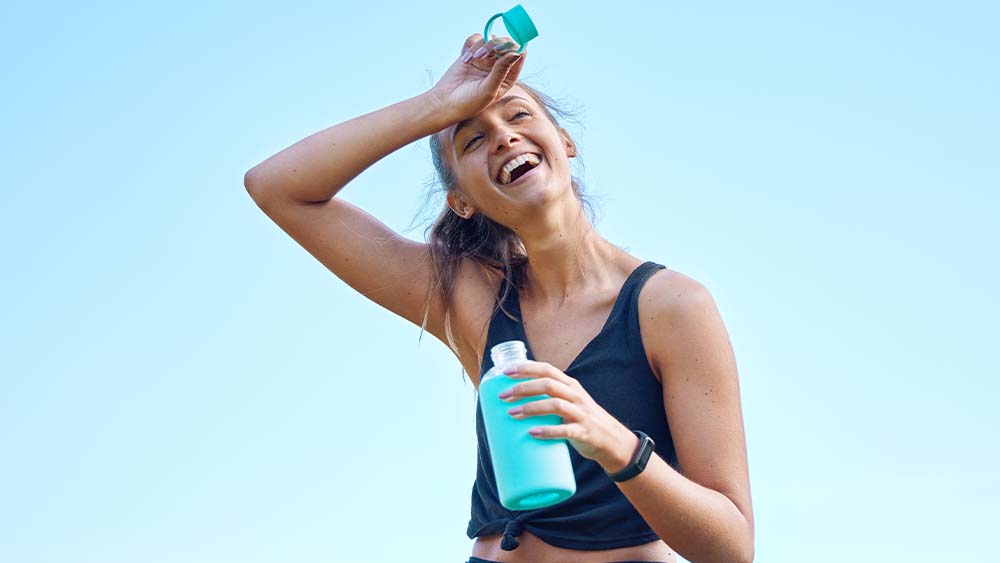Whether you're an elite athlete pushing your limits or someone exercising to stay healthy, hydration is key to performance—especially when working out in high temperatures. The combination of exercise and heat increases the body's need for fluids, making it essential to manage hydration effectively to prevent dehydration and keep your body functioning optimally.
The Impact of Heat on Your Body
When you exercise, your core body temperature naturally increases. In hot environments, the body loses even more fluid through sweat, which is the body's primary cooling mechanism. However, in extreme heat, sweat evaporates less efficiently, causing your body to struggle in maintaining a safe temperature. This results in:
- Increased Effort: As the body works harder to regulate temperature, blood flow is diverted from muscles to the skin, reducing muscle endurance and making it harder to sustain physical activity.
- Faster Fatigue: The added effort of cooling down drains energy more quickly, causing you to tire faster.
Endurance athletes are particularly affected by these conditions, as they may experience a significant decline in performance due to the combination of heat and dehydration.
Signs of Dehydration
Dehydration can quickly derail your performance, especially when exercising in hot weather. Even a small fluid loss can have a noticeable impact. Research from hydration expert Lawrence Armstrong shows that losing just 2% of body fluids can lead to a 3% decline in performance for activities like long-distance running. In severe cases, performance could drop by up to 30%.
Watch out for these common signs of dehydration:
- Dark urine
- Dizziness or lightheadedness
- Muscle cramps
- Nausea or vomiting
- Rapid heartbeat
- Lack of sweating, despite exertion
- Clammy skin or dry mouth
- Extreme fatigue
- Heatstroke (body temperature over 40°C)
How to Stay Hydrated During Endurance Events
Staying hydrated while exercising in the heat requires more than just drinking water. While water is vital, endurance athletes often need drinks that contain both carbohydrates and electrolytes. These drinks offer two key benefits:
- Carbohydrates provide essential fuel for muscles, helping to maintain energy levels.
- Electrolytes such as sodium aid in the absorption of fluids and replace those lost through sweat.
Hydration Strategy: Before, During, and After Exercise
To stay properly hydrated, it's essential to have a plan before, during, and after your workout or event:
- Hydration Before an Endurance Event
Proper hydration begins well before your workout. Stay well-hydrated throughout the day, especially leading up to the event. A good indicator of proper hydration is pale yellow urine.
- Hydration During an Endurance Event
During the event, maintaining performance and preventing dehydration is crucial. The National Strength and Conditioning Association recommends consuming 90 to 240 ml of a drink containing 6–8% carbohydrates and electrolytes every 10 to 20 minutes. This helps to:
- Maintain blood glucose levels
- Prevent fatigue
- Replenish lost fluids and electrolytes
- Hydration After an Endurance Event
Hydration should continue after the event to restore any lost fluids, electrolytes, and nutrients. During events like Ironman triathlons, athletes can lose up to 12% of their body weight in water, especially in hot conditions. Failing to rehydrate can lead to prolonged recovery times and diminished post-event performance.
Best Post-Event Hydration Fluids
The best fluids for post-event hydration include drinks containing diluted carbohydrates (CHO) and sodium. The concentration of these drinks should match the environmental conditions:
- In hot conditions, use a hypotonic solution (less than 5% CHO) for effective water replacement.
- In cooler environments, an isotonic solution (5–8% CHO) is recommended for balanced hydration.
Additional Hydration Tips for Hot Conditions
- Monitor Your Sweat Rate: Weigh yourself before and after a workout to gauge how much fluid you’ve lost. This can help determine how much to drink during and after exercise.
- Avoid Dehydrating Drinks: Limit caffeinated and alcoholic drinks, as these can accelerate dehydration.
- Hydrate Early: Start drinking fluids early in the day, well before your workout begins.
- Use Electrolyte Supplements: In extreme conditions, supplement your water with electrolyte tablets to ensure proper sodium and potassium levels.
- Dress Appropriately: Wear light, breathable clothing to minimise heat retention and enhance sweat evaporation.
Hydration is a critical factor in ensuring peak performance, especially in hot weather. By staying hydrated before, during, and after exercise, you can improve endurance, prevent dehydration, and safeguard your overall health. Remember, it’s not just about drinking water—it’s about finding the right balance of fluids, electrolytes, and carbohydrates to fuel your body through intense activity. Stay informed and stay hydrated for optimal results.

